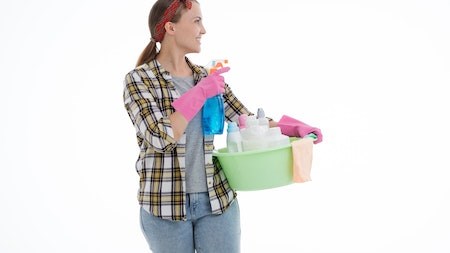Most people are only too glad to come across ways of getting household chores done as quickly and easily as possible. After all, it often feels as if no sooner have you washed the dishes, put away the clean washing and vacuumed the carpets than you have to start all over again.
Although there are plenty of tips online – and on the neighbourhood grapevine - about getting through the cleaning process more efficiently, there are many that do a lot more harm than good.
WATCH : Simple steps for a more organised space.
Some of these cleaning tips really don’t work. You could end up with a bigger mess than you started with and even damage your equipment, clothing items or furniture.
Stains
It’s a mistake to pour water on carpet stains – either hot or cold. Over-saturating stains can damage carpet fibres, and excess moisture can leak through to the underfelt and floor, where it will pool and cause mould.
Instead, blot the stain carefully to remove most of the liquid. Then, spray lightly with sparkling or soda water – be careful not to wet the carpet too much. Then blot again with a clean paper towel or cloth. Repeat until the stain fades, then apply a specialised carpet stain remover. Follow the instructions carefully.
Never put salt on a red wine carpet stain. It may look as if the salt is absorbing the red colour, but the salt can cause the stain to set. Because salt is abrasive, it could also damage the fibres, and some of the finer salt grains may stick to the fibres, stiffening the pile. When you walk on the carpet, the stained area will attract grime and will always look dirty.
Instead, blot up as much liquid as possible, then dab the mark with soda or sparkling water. Follow this with a specialised stain remover. Be sure to follow the directions.
Don’t try to remove label adhesive deposits on new appliances with nail polish remover. It could cause surfaces of appliances like fridges or microwaves to be discoloured. Not only will your new appliance look instantly worn, but it could also mean the guarantee is void.
Instead, try baby oil or mineral oil to eliminate the sticky residue. Your local hardware store may also stock a good adhesive remover.
Bleach
Bleach is great for cleaning toilets, but don’t use it - or any harsh chemical - to descale and clean your coffee machine. It can damage some of the machine parts, and even if you rinse the machine thoroughly, there’s a chance your coffee could still have a lingering chlorine taste.
Instead, use a specialist coffee cleaner or descaling product. Read the manual to see if the manufacturer recommends a specific product rather than using something that could void the guarantee.
Using bleach on rust stains could aggravate the problem. Instead, use vinegar or lemon juice – depending on the type of surface that is stained. Rub onto the surface and leave to stand for half an hour. Then scrub with a stiff-bristle brush.
Vinegar
This useful household product is another cleaner you need to use with care.
Vinegar is excellent for cleaning windows and getting rid of limescale around taps. However, it can etch natural stone surfaces such as marble or granite countertops or tiles. It can also damage the iron’s internal system, and it, unfortunately, doesn’t remove all stains.
For cleaning natural stone surfaces, it’s best to invest in a specialist stone cleaner. To clean your iron, form a paste by mixing one tablespoon of water with two tablespoons of bicarbonate of soda. Apply to the iron’s soleplate with a rubber spatula or a clean face cloth. Then wipe off with a damp cloth, fill the iron with clean water and turn on the steam setting.
Digital screens
Window cleaners with ammonia or alcohol can strip anti-reflective coatings from computer monitors and television screens and can cause permanent damage to these appliances.
Instead, invest in an alcohol-free dedicated LCD or plasma screen cleaner. Spray the liquid onto a microfibre cloth, then gently wipe the screen.
The guidelines provided above are sufficient to assist you in protecting your office or household items while cleaning.
Writer : Sarah-Jane Meyer




